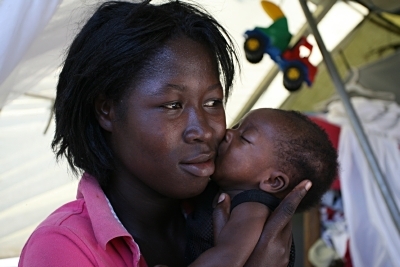Editor’s note: This post was written by Patrick Robin, a Senior Program Officer for the American Red Cross team carrying out projects in Haiti. Patrick previously lived in Haiti for two years and feels a special commitment to helping people recover and thrive from the January 2010 earthquake.
On a recent trip to the north of Haiti, I began to really admire the work of the local community organization, Haiti Outreach Pwojè Espwa (HOPE)—an American Red Cross partner. HOPE’s medical professionals trek over five miles,on foot, to run mobile medical clinics in hard-to-reach rural communities.
The Red Cross is providing financial support and practical assistance to HOPE to run these mobile clinics and hospitals in remote areas of Borgne, a town in northern Haiti. The clinics provide a lot of different health services, including helping pregnant women get the care they need to stay healthy.
In Borgne, the number of women attending prenatal clinics is far below the number of pregnant women who live there. Distance to health centers is often a barrier, but attitudes in rural areas are also a compounding factor. The way many people see it is that pregnancy is not an illness, so it does not require medical attention.
In order to help pregnant women, HOPE is establishing and scaling up mothers’ clubs: weekly group meetings in which 20-30 women discuss pre- and post-natal and infant health, family planning, nutrition and cholera prevention.
When I was in Borgne recently with my colleagues Vanessa Deering and Daphney Richemonds, we saw the women perform skits and songs that drove the point home. One skit was about at-risk pregnancies and went like this: A 40-year old pregnant woman has swollen feet and complains to her friend of having nagging headaches and other signs of preeclampsia. Her friend listens and urges her to go the clinic, but the pregnant woman reassures her friend that the traditional healer she consults tells her not to worry and that she is only showing signs of carrying twins.
After the skit, women in the mothers’ club talked about the signs of preeclampsia and learned about what can happen when the disease is not treated: full blown eclampsia, difficult delivery and a high probability of the mother and child not surviving.
The women then sang a song to reinforce the message that all this suffering can be prevented by seeking care during pregnancy and delivering babies at the hospital.
Other skits that day illustrated the importance of breast feeding; not introducing solid foods until the baby is at least six months old; and how family planning can help women space births and recover from one pregnancy before starting another.
In the coming months, with financial support from Red Cross, HOPE plans to establish seven mothers’ clubs across Borgne. It is so nice to work alongside HOPE—an organization full of committed and dedicated people. I really sense the passion and love they have for their community.


